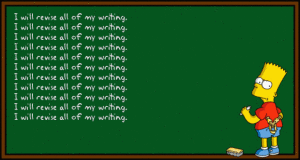08.15.14Judith Hochman on Editing versus Revising
 Had the pleasure, Monday, of meeting with Judith Hochman, whose Hochman Writing Method has been profiled extensively (for example here) for its remarkable results. By the end of our meeting, my notebook was full of double-underlined insights describing tools for teaching writing better and the nature of the connection between writing and reading. But I keep thinking of one insight in particular- even without going back to check my notes. This was Hochman’s reflection on the difference (and the importance of distinguishing) between editing and revising.
Had the pleasure, Monday, of meeting with Judith Hochman, whose Hochman Writing Method has been profiled extensively (for example here) for its remarkable results. By the end of our meeting, my notebook was full of double-underlined insights describing tools for teaching writing better and the nature of the connection between writing and reading. But I keep thinking of one insight in particular- even without going back to check my notes. This was Hochman’s reflection on the difference (and the importance of distinguishing) between editing and revising.
Editing vs. Revision. Editing is fixing basic errors like capitalization, punctuation and spelling. Revising is the task of improving writing-specifically by revising structure or word choice. Generally for writing instruction to be effective we have to make a habit of constantly looking at and re-working what students write. But as Hochman pointed out, Revising is much more rigorous. It’s where the work really happens- where an idea is framed, distilled to its core elements, and brought to life. Editing is fine; revision is critical. Which is important to observe because 1) many (most?) teachers don’t distinguish between the two and 2) if you let students choose–that is if you put a block of text in front of them and say something like “What suggestions do you have to improve it?”–they will generally choose to edit rather than revise, primarily because it is easier to add a missing capital letter than to rework a sentence to use a subordinating conjunction and make your verb more precise and active, say. In fact many teachers, too, will choose editing over revising- for exactly the same reason. We’re drawn to the low hanging fruit, so when we look at text in the classroom there can be a “rigor gap” if we’re not careful to revise more than edit.
Hochman’s teaching approach is to instruct students in the use of common syntactical devices and to practice them over and over, then, once mastered, to have them use those to improve their sentences. One example of that would be to ask students to add an appositive phrase to a sentence that lacks substance. In a video of hers i observed, a teacher at New Dorp High School in Staten Island began editing the student sentence, “Gandhi had an impact.” The teacher first asked her students to use a Turn and Talk to write four good appositives to describe Gandhi. Students then inserted the best of their appositives into the sentence so that it read, for example, “Gandhi, a pacifist and important leader, had an impact.” After the teacher asked her students to add a few more clarifications, the students came up with sentences like: “Gandhi, a pacifist and important leader in India, had a strong impact on society.”
Not only had her students had made this sentence markedly better, it was that they were learning how to use a replicable device, the addition of an appositive phrase, to improve any sentence they might write. That’s the power of a good revision task- it teaches a replicable skill.
With thanks to Judy for the insights, I made a list of some high-value revision tasks teachers could use when looking at student writing. As an aside, rigorous, focused and fungible revision tasks are an ideal tool to combo with Show Call, which, if you’re not familiar with, you should be… and you can read about it here and here; the basic idea is Cold Call + Document Camera = Show Call):
- Take a look at Ivan’s work here. I want you to use a subordinating conjunction to add crucial information.
- Take a look at Ivan’s work here. I want you to rewrite his sentence so it starts with the prepositional phrase “Under the hot sun…”
- Take a look at Ivan’s work here. I want you to add an appositive to describe a key noun and add background and depth to the sentence.
- Take a look at Ivan’s work here. I want you to find two places where more specific technical vocabulary could make his work even better.
- Take a look at Ivan’s work here. I want you to find at least one place where he could replace a direct quotation with a partial or full paraphrase. Be ready to show us how he could write into or out of the quotation.
- Take a look at Ivan’s work here. I want you to find his two best, most dynamic verbs and then find two verbs you could upgrade to make his writing stronger.
- Take a look at Ivan’s work here. I want you to use a phrase beginning with “but” “because” or “so” to improve this sentence.
- Take a look at Ivan’s work here. I want you to take these two sentences and combine them to show how the ideas connect and make your writing more fluid.
